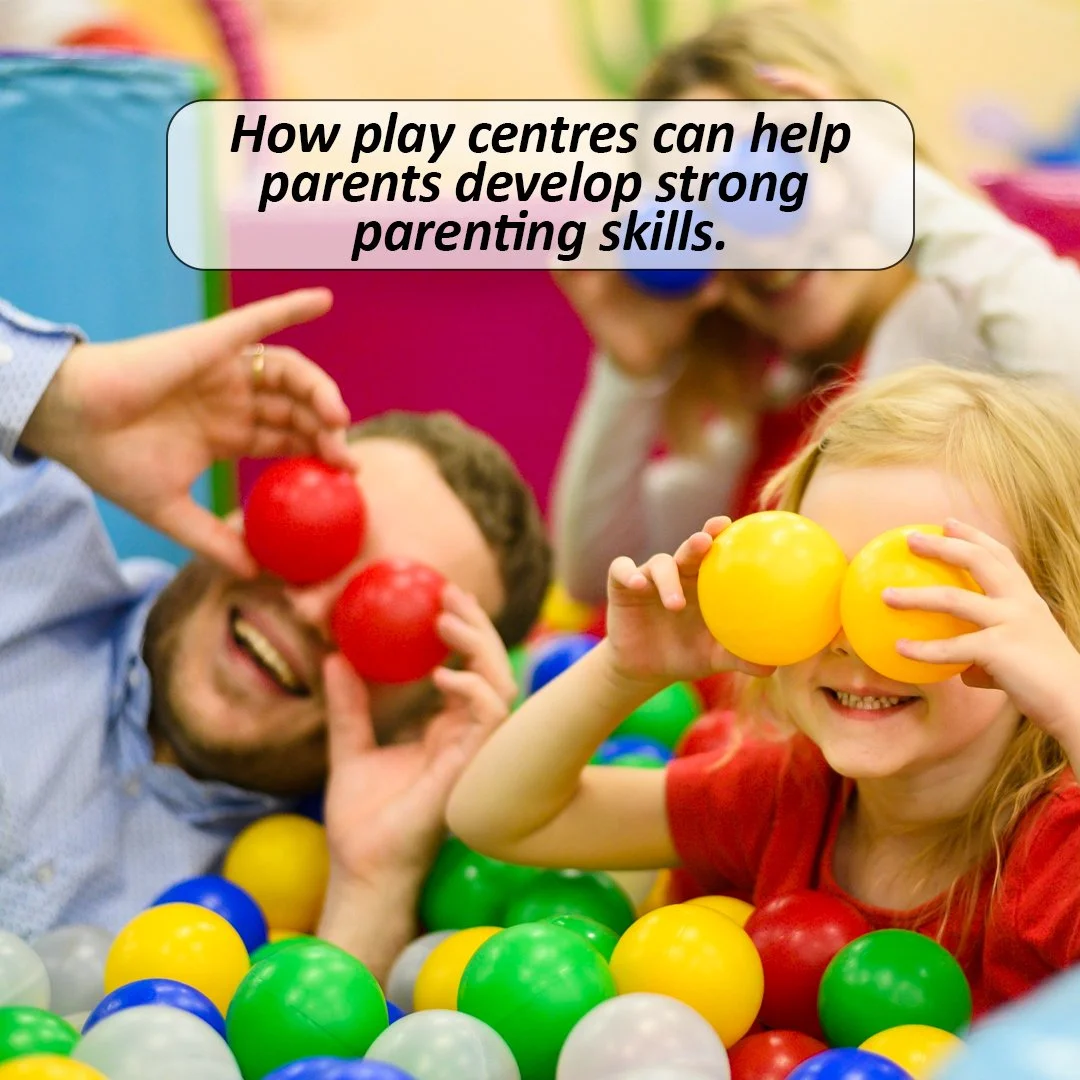How play centers can help parents develop strong parenting skills
Parenting is undoubtedly one of the most challenging roles you’ll ever undertake, and mastering parenting skills is crucial to shaping a child's future. In today’s digital age, where video games and screens dominate children’s lives, the simple joys of play centres have become overlooked. The gap between generations has never felt wider, making the task of effective parenting more daunting than ever. Every parent is perfect for their children, but by incorporating some tips like - choosing Soft Play Exeter, you can boost your parenting approach and build a happier, healthier family dynamic. Because what truly matters is honing your parenting skills to navigate the complexities of modern family life.
This blog aims to provide practical, actionable tips for improving parenting skills, addressing everyday challenges, and fostering a nurturing environment for parents and children. Let’s explore how.
What Are Good Parenting Skills?
Effective parenting skills are pivotal in shaping your child’s future, influencing their development and overall well-being. Mastering these skills can lead to a more confident, resilient, and well-adjusted child. By focusing on good parenting practices, you help foster a sense of self-worth, confidence, and trust, which are crucial for your child’s mental and emotional health.
Why It Is Important
Good parenting skills are essential because they directly impact your child's mental, and physical growth and emotional well-being. When you are choosing Soft Play Newton Abbot, To practice effective parenting, you not only enhance your child’s self-esteem and trust but also help them form healthy relationships and develop strong coping mechanisms. This proactive approach creates a nurturing environment where your child feels secure and valued, ultimately leading to better adjustment and happiness.
The 4 C’s of Parenting
Consistency: Establishing stable rules and routines gives your child a sense of security and predictability. Consistency helps children understand expectations and reduces anxiety, making them feel more grounded and supported.
Communication: Open and honest conversations are crucial for a healthy parent-child relationship. Encouraging your child to express their thoughts and feelings freely fosters trust and strengthens your connection, allowing you to address their concerns effectively. Play centers play a crucial role in developing good communication skills in children.
Compassion: Empathy and understanding are crucial for your child’s emotional development. By acknowledging their feelings and experiences, you help them feel valued and supported, which enhances their emotional resilience and ability to navigate life’s challenges.
Control: Balancing guidance with independence is key to effective parenting. Providing appropriate boundaries and guidance while allowing your child to make their own decisions helps them develop critical thinking and problem-solving skills, preparing them for future challenges.
Having explored the essential components of good parenting skills, it’s time to delve deeper into specific strategies. Next, we’ll examine the top 10 parenting skills that can make a significant difference in your child's life.
Top 10 Parenting Skills
Effective parenting goes beyond meeting your child's basic needs; it involves shaping their future with thoughtful and intentional actions. Here’s a look at the top 10 parenting skills that can significantly impact your child’s development and overall well-being:
1. Focus on Behaviour from the Start
Setting clear expectations and boundaries is crucial from the moment your child begins to explore the world. For instance, if your children are pushing boundaries at mealtime, consistent rules about table manners can prevent future conflicts. Establishing these guidelines early helps your child understand acceptable behaviour and fosters a sense of security and stability. This proactive approach not only prevents misunderstandings but also builds a foundation for respectful and responsible behaviour.
2. Tell Them What Is Real Entertainment
In today's digital age, where children are increasingly drawn to video games and screen time, guiding them towards healthier forms of entertainment is essential. For example, selecting a Indoor Play in Exeter can help children develop important social skills as well as support their cognitive development. It encourages them to imagine, think, understand, communicate, and play. A safe environment for young children fosters the development of skills that can last a lifetime. The play equipment allows toddlers to balance and climb independently while also learning to interact with others. Unlike passive screen time, play centres promote physical exercise and enhance mood, contributing to a healthier lifestyle.
3. Teach Them Love and Affection
Showing and nurturing love and affection are cornerstones of emotional development. Think about a situation where your child feels left out at school; a hug and reassuring words from you can help them feel valued and supported. Regularly expressing love builds self-esteem and trust, laying a strong emotional foundation that helps your child develop healthy relationships and a positive self-image
4. Stress Management
Both parents and children experience stress, and finding effective ways to manage it is vital. Imagine a hectic day where the pressures of work and school have everyone on edge. Choosing a play centre for your children after school sounds like a fantastic idea, doesn't it? It provides a delightful transition from a stressful day to a fun, playful time. This experience offers a joyful and effective way to release tension, improve mood, and strengthen family bonds.
5. Teach Them Relationship Skills
Equip your child with essential relationship skills by teaching them how to handle social interactions effectively. For example, if your child disagrees with a friend, guide them through respectful communication and conflict resolution. Teaching them to navigate these situations with empathy and respect will prepare them for successful and fulfilling relationships throughout their lives.
6. Make Them Spiritual
Encouraging spiritual growth can provide your child with a sense of purpose and belonging. For instance, involving your child in community activities or discussions about values and beliefs helps them build a strong moral framework. This spiritual development fosters a deeper connection to the world and helps them navigate life with a sense of direction and understanding.
7. Life Skills
Preparing your child for future independence involves teaching them practical life skills. Imagine your teenager learning to manage a budget or plan for a future goal. Involving them in financial decisions and savings plans teaches them responsibility and equips them with essential skills for managing their own lives effectively.
8. Prioritise Education and Learning
Your choices today will reflect your children's future. Always be very careful when selecting things for your children, whether it's their first play zone, their first school, or anything else. Conduct thorough research and choose the best options for them. Children begin learning from their crawling stage, so developing essential skills becomes increasingly crucial.
Supporting your child's educational journey is vital for their success. If your child struggles with a subject at school, providing additional help or resources can make a significant difference. By fostering a love for learning and actively supporting their academic efforts, you create an environment that values education and encourages curiosity and achievement
9. Ensure Their Safety
Creating a safe environment at home is fundamental for your child’s well-being. For example, child-proofing your home and discussing safety measures, such as not talking to strangers online, helps protect them from potential risks. Being proactive about safety ensures your child feels secure and understands how to navigate various risks.
10. Supporting Health
Encouraging physical health through activities such as climbing, balancing, and even crawling helps introduce your child to the importance of staying active. If your child tends to prefer sedentary activities, getting them involved in sports or physical activities, like play centres, can be an excellent way to show that health is valuable. Regular physical exercise not only improves their physical health but also boosts their mood and enhances social skills.
By integrating these top 10 parenting skills into your daily life, you address common challenges and create a nurturing environment that supports your child’s overall development. Next, we will explore practical tips to further enhance your parenting approach and effectively tackle everyday issues.
7 Tips for How to Be Good Parents
Here are eight practical tips to enhance your parenting skills and address real-life challenges
Be a Role Model: Your actions set the tone for your child's behaviour. Strive to lead by example. For instance, if you prioritise your health, such as working out daily, your child is more likely to adopt similar healthy habits. Practice gratitude, show respect, and maintain a balanced lifestyle. Remember, your habits are the shadow your child will follow, so embody the values and behaviours you want to instil in them.
Avoid Bad Habits: Children often mimic the habits they observe. Avoid negative behaviours such as excessive screen time or unhealthy eating. For example, if you’re trying to cut back on sugary snacks, model this change by choosing healthier alternatives and involving your child in meal planning. This not only promotes healthier choices but also demonstrates discipline and self-control.
Make Time for Them: Life can be busy, but making time for your child is essential. Schedule regular one-on-one activities, like playing a game, or going to Indoor Play in Newton Abbot or play centres having a heart-to-heart conversation. Even small moments, like reading a bedtime story or sharing a meal, can make a significant impact on your child's emotional well-being and strengthen your relationship.
Discuss Their Problems and Be Part of Their Happiness Like a Friend: Approach your child’s problems with empathy and openness. If they face a challenge at school or with friends, listen actively and offer support. Celebrate their achievements and joys, such as a good grade or a successful soccer game. By being involved in both their struggles and successes, you build a strong, trusting relationship where they feel valued and understood.
Help Them to Make a Difference Between Good and Bad: Teaching your child to differentiate between right and wrong is crucial for their moral development. For instance, explain the consequences of dishonesty or disrespect and model ethical behaviour through your actions. Use real-life situations to discuss moral dilemmas and guide them in making thoughtful, responsible decisions.
Let Them Have Their Own Experiences and Learning: Allow your child to explore and learn from their own experiences. If they are eager to try a new hobby or make a mistake, support their exploration while providing guidance.
By incorporating these eight tips into your parenting approach, you address everyday challenges and foster a supportive, nurturing environment for your child. These strategies will help you build a stronger relationship with your child, guiding them toward becoming well-adjusted and confident individuals.
Conclusion
Good parenting isn't about perfection; it's about making thoughtful choices that nurture your child’s growth and well-being. The skills and strategies we’ve explored together can transform everyday challenges into opportunities for connection and learning. By focusing on behaviour, providing healthy alternatives, managing stress, and teaching essential life skills, you set the stage for your child to thrive.
As you embark on this journey, remember that every step you take towards better parenting has a profound impact on your child’s future. Embrace these tips, and watch how they enrich your relationship and support your child’s development.
We’d love to hear from you—share your parenting experiences and let us know how these tips have made a difference in your life. Your journey and insights can inspire and help others in the parenting community. Together, we can create a supportive network that fosters growth and happiness for both parents and children. So go ahead, apply these strategies, and celebrate the positive changes in your family’s life!
FAQ’s
-
The top skills include patience, communication, empathy, discipline, adaptability, active listening, problem-solving, setting boundaries, consistency, and positive reinforcement.
-
Be present, listen actively, show unconditional love, and prioritise self-care to stay emotionally and physically available for your child
-
It refers to a parenting style where a mother is emotionally distant or unresponsive, which can impact a child’s emotional development.
-
Play helps build stronger parent-child bonds, fosters learning, and supports emotional, social, and cognitive development in children.
-
Play centres offer safe, engaging environments where children can explore, socialise, and develop essential skills through play.




